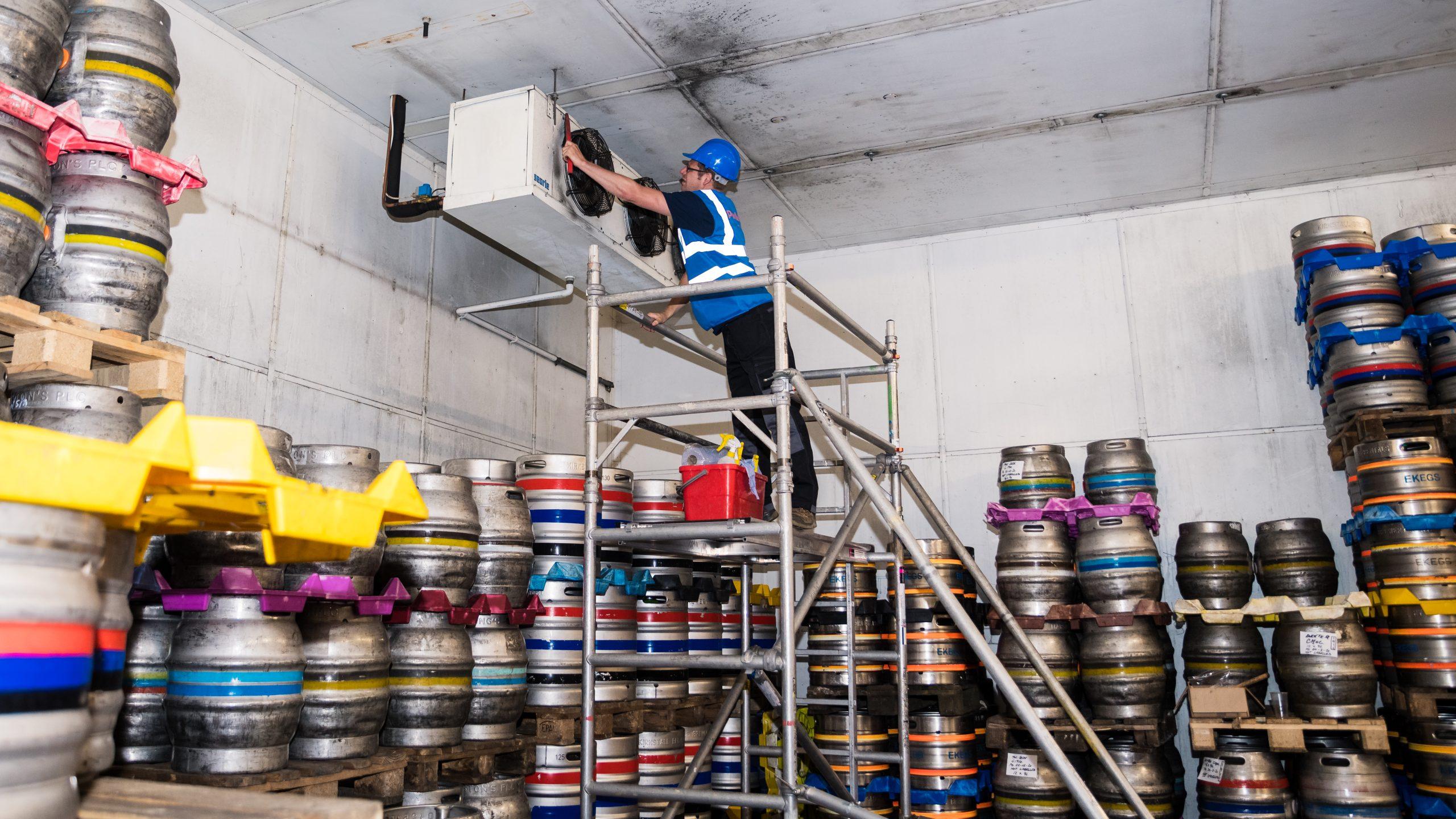
Is your cellar cooling not working? Sometimes it can be difficult to identify issues that arise in your cellar’s cooling systems, and that’s why we’ve decided to list some common problems and fixes in our cellar cooling troubleshooting guide.
Why Is My Beer Cellar Cooling Not Working?
A decrease in cooling performance is a surefire way to tell if your beer or wine cellar cooling equipment needs repair or replacement. This could be caused by low refrigerant levels, a malfunctioning thermostat or a faulty compressor. Regular cellar cooling maintenance from a qualified engineer will ensure a longer life for your equipment.
Regularly Check The Cellar Cooler Temperature
You should check the air temperature and humidity of your cellar daily and record the measurements so that you can identify any trends. This will allow you to take any precautionary action before it becomes a real problem. Higher temperatures and humidity in your cellar can indicate a problem with your system.
To check the correct temperature, use two thermometers and place them in different parts of the cellar at cask/keg beer height and away from walls or the direct airflow from the cellar cooling system.
How Cold Should A Cellar Cooler Be?
Cellar coolers can operate at a range of temperatures but are most often set between 11°C and 13°C.
Maintaining this cellar temperature could significantly reduce your cellar energy costs as overcooling the cellar by 1°C could increase your costs by up to 10%.
Blocked Grills
You should regularly clean the grills on your cooling system to remove dust and debris and make sure that none of your stock is blocking them, as this causes your cellar cooling to overwork and can cause your system to overheat. This will increase the cost of operating your equipment, which can be up to 40% annually.
Since operating costs typically run more than £1,500 a year, keeping your unit in good condition could save you up to £800 a year.
Keeping Your Unit On
The cellar cooling system should be switched on at all times, and the cellar fans should run continuously. Some people switch off the system when they are working in the cellar as it does tend to be noisy and pushes out cold air, but staff don’t always remember to switch it back on, which results in the temperature increasing.
You should also make sure that your cellar doors aren’t being left open, as this will let warm air enter and cold air escape (above ground cellars will benefit from strip curtains) and could also cause excess frost on the evaporator that the defrost mechanism cannot cope with. A manual defrost may be required which involves switching off for 24 hours.
Remember not to switch off your unit at night as if the cellar is cold enough it will switch itself off, as required. To help your cellar cooling equipment in the long run, particularly your condensing unit, consider installing ambient beer cooling, which makes use of the ambient air temperatures in winter to cool the cellar.
Unusual Sounds Or Odours
Should your cellar cooling system be producing odours or making unusual noises, it can indicate a problem. Worn or broken parts can cause squeaking hissing or grinding sounds. Similarly, a musty or burning smell can indicate a problem. Should you experience any of these, contact a qualified engineer immediately.
Leaking Equipment
The majority of the time, a water leak from cooling equipment will be as a result of a blocked drain and will likely be condensation from the evaporator coils, but in rare cases, it could be originating from a refrigerant leak. If you notice a leak, contact a qualified engineer as soon as possible. A refrigerant leak is important to get fixed immediately as part of your responsibilities towards F Gas regulations in the UK.
Cellar Cooling Troubleshooting – General Advice
There are also a number of things that you can do to ensure the efficient running of your cooling system:
Replace standard tungsten bulbs with LED or fluorescent strip lighting. Turn off lighting whenever you can to avoid excess heat production.
Regularly clean evaporators and heat rejection coils to allow free airflow – that way they’ll run more economically.
You need to ensure that your equipment is properly maintained (most units require a check twice a year) so that it operates efficiently. If your equipment is not maintained properly it will need to run for longer periods of time, which will cost you more money and could potentially break down causing disruption to your business.
Put any heat-producing equipment such as line python coolers for beer and soft drinks, cooling cabinets and icemakers outside the cellar in a well-ventilated area.
If heating pipes have to pass through cellars, pipes & fittings should all be insulated and draught stripping applied in places where pipes pass through walls.
Beer Cellar doors and hatches should also be draught-proofed and insulated. Access doors should be self-closing and shut immediately after deliveries.
Support Is Available
We hope informing you of these issues will help you determine where your cellar cooling is facing problems. You can also download our beer cellar cooling troubleshooting guide to help you identify fixes for any issues.
If you are still facing problems with your cellar cooling after trying some of the fixes we have provided, or if your warranty has expired, then you can give our professional team of engineers a call, and we’ll be happy to help you.
Take our Air Conditioning or Commercial Refrigeration Healthcheck to see how healthy your equipment is, and to see if it’s due a maintenance check.